Stephen Morris's Blog, page 10
November 29, 2021
Nativity of Christ in Early Christian Literature
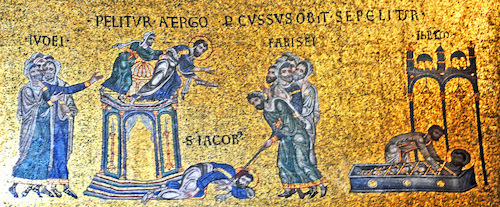 The Martyrdom of St. James, who was thrown from a parapet of the Temple (where Jesus was tempted by the Devil) and then clubbed to death—Mosaic from St. Mark’s in Venice.
The Martyrdom of St. James, who was thrown from a parapet of the Temple (where Jesus was tempted by the Devil) and then clubbed to death—Mosaic from St. Mark’s in Venice. Much early Christian literature, the so-called “apocrypha” of the New Testament, are collections of Christian folktales and sermonettes that are meant to make connections between the Old Testament and the experiences of the early Christian communities. The audience of these collections were not stupid people; they knew what was an exciting novella based on the experiences of the martyrs and what were the scenes made up to fill in the gaps of the story.
One example of such “midrash,” the homiletic-style of telling a Bible story with commentary included, is the Protoevangelium of James which tells the stories of the birth and childhood of the Virgin Mary and Jesus. The Protoevangelium is said to have been written by the Apostle James, the author of the epistle with his name in the New Testament. James was the step-brother of Jesus; he was the youngest son of St. Joseph, who was an older man who had been married before. The stories in the Protoevangelium make explicit what the New Testament implies and underscore-reiterate what the Gospels tells us of Christ.
The Protoevangelium was written approx. AD 150 but incorporates much older material, including the memories of the Jerusalem community of Christians. Long thought by Western scholars to be a complete fiction because of its unusual details, many of these details in the Protoevangelium have been proven correct by recent archeological discoveries (such as the dormitory of a women’s community that lived adjacent to the Temple) and the discovery of other manuscripts that reveal previously unknown 1st century Jewish practices. So, rather than making up fairy tales about Christ and his mother, we now know that the Protoevangelium has preserved long-forgotten details that the original readers would have been familiar with.
Beginning next week, and continuing for the next three-four weeks, we will examine some of the stories in the Protoevangelium about Jesus’ birth and discover what these old stories, meant to supplement the Gospel accounts, can tell us about Christ’s nativity.
The post Nativity of Christ in Early Christian Literature appeared first on Stephen Morris, author.
November 23, 2021
Apostle James & Prophet Job
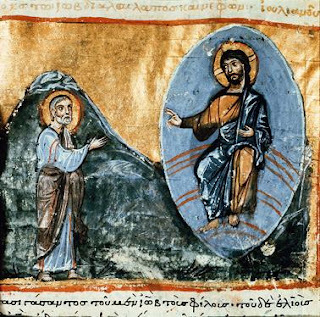
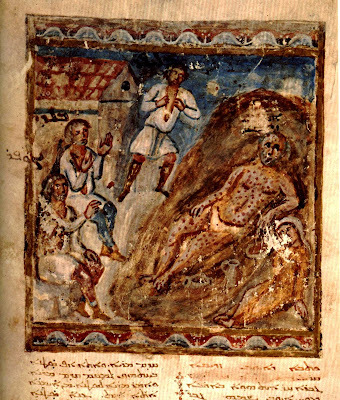
 The prophet Job is seen in these two Byzantine manuscript illuminations and a Russian icon: the illuminations show Job’s initial affliction with boils and his arguments with his wife and friends as well as Job’s final discussion with the Logos at the conclusion of the Old Testament book (“Where were you when I made the world?” God asks Job). The Russian icon depicts Job as a king (which is how Job is described in the oldest texts of the Old Testament).
The prophet Job is seen in these two Byzantine manuscript illuminations and a Russian icon: the illuminations show Job’s initial affliction with boils and his arguments with his wife and friends as well as Job’s final discussion with the Logos at the conclusion of the Old Testament book (“Where were you when I made the world?” God asks Job). The Russian icon depicts Job as a king (which is how Job is described in the oldest texts of the Old Testament).Brothers and sisters, as an example of patience in the face of suffering, take the prophets who spoke in the name of the Lord. You know, we count as blessed those who have persevered. You have heard of Job’s perseverance and have seen what the Lord finally brought about. The Lord is full of compassion and mercy. (James 5:10-11)
The figure of Job in the Old Testament has commonly been considered a prophet for most of Christian history because of his stalwart preaching to his friends during the afflictions he suffered and because he was thought to be a type–a prefiguration–of Christ because of his patient, innocent endurance. In the version of the Old Testament that James and his audience knew, the conclusion of the book of Job reads:
“And it is written that he will rise again with those whom the Lord raises up.
“This man is described in the Syriac book as dwelling in the land of Ausis, on the borders of Idumea and Arabia; and his name before was Jobab; and having taken an Arabian wife, he begat a son whose name was Ennon. He himself was the son of his father Zara, a son of the sons of Esau, and of his mother Bosorrha, so that he was the fifth from Abraham. And these were the kings who reigned in Edom, which country he also ruled over. First Balak the son of Beor, and the name of his city was Dennaba. After Balak, Jobab, who is called Job….”
(Job 42, LXX)
Job not only endured his unjust suffering patiently, he was expected to be among the just who would be raised on the Last Day. His suffering and promised resurrection were both seen by early Christians as pointing to the innocent suffering and promised resurrection of Christ as well as the innocent suffering of the early Christian community and the resurrection they expected to share as well at the Last Day. (It is this version of the conclusion of the Book of Job that is read on Good Friday afternoon by Eastern Christians each year.)
Patiently enduring undeserved suffering and affliction is one of the major themes of the epistle of James. Various sins–pride, hypocrisy, favoritism, slander–only bring more suffering to the community. James urges his readers to live with humility and godly–not secular–wisdom. Prayer is an essential part of this, James tells his readers.
Patience and humility are the direct result of the prayerful expectation of the coming Resurrection. Knowing they will be raised, James’ readers are able to see their experiences from a different perspective and in another light than those who think their deaths will mean the end of their existence. Expecting the resurrection, James’ readers no longer need to fear death and because they do not fear death, they can endure suffering with patient prayerful endurance. They can be like the prophet Job, sharing in Christ’s patient suffering and victorious resurrection.
The post Apostle James & Prophet Job appeared first on Stephen Morris, author.
November 16, 2021
Unpaid Wages Cry to Heaven
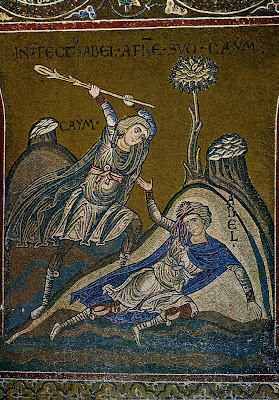 Cain kills Abel in the 12th-13th century Byzantine style mosaics of the cathedral in Monreale (Sicily).
Cain kills Abel in the 12th-13th century Byzantine style mosaics of the cathedral in Monreale (Sicily).Come now, you rich, weep and wail over your impending miseries. Your wealth has rotted away, your clothes have become moth-eaten, your gold and silver have corroded, and that corrosion will be a testimony against you; it will devour your flesh like fire. Behold, the wages you withheld from the workers who harvested your fields are crying aloud and the cries of the harvesters have reached the ears of the Lord of hosts. (James 5:1-4)
Do these words sound familiar? So much early Christian preaching, so many of the Church Fathers, say the same thing in a variety of ways: the money and possessions of the rich have been stolen from the poor and should be returned to their rightful owners. The unpaid wages owed the workers cries to heaven as the blood of Abel cried out to God, demanding justice against his brother-killer Cain. By not paying their workers, the rich do as great an injustice to them as Cain perpetrated against his brother. Economic injustice is as great a crime as murder.
The stolen wealth of the rich will rot away and testify against them on Judgement Day, the epistle tells us. The fine clothes the rich wrap around themselves are already rotten shrouds falling away from the walking corpses of the rich.
Christian care for the poor was fundamental to the life of a Christian community. Julian the Apostate, the emperor who tried to revive pagan worship after the legalization of Christianity, famously complained, “… the impious Galileans [Christians] support not only their own poor but ours as well; all men see that our people [pagans] lack aid from us.” Christians cared for everyone, whatever their beliefs. Anyone in need was one of the least of Christ’s brethren and deserved the care of Christ’s Body, the Church.
Too many modern people do not realize how rich they are compared to the rest of the world. Too many modern people do not appreciate what they have stolen from the poor who are both next door and on the other side of the earth. I’m afraid that many people would repeat Julian’s complaint that the Christians put everyone else to shame in terms of caring for the poor. On Judgement Day, that will probably be the greatest indictment against contemporary Christians.
Read more about the blood of Abel crying out to heaven here. Read Takanori Inoue’s work on The Early Church’s Approach to the Poor in Society and Its Significance to the Church’s Social Engagement Today online here.
The post Unpaid Wages Cry to Heaven appeared first on Stephen Morris, author.
November 10, 2021
Fighting the War Within Myself
 The Sacrifices of Cain and Abel depicted in 12th-13th century mosaic
The Sacrifices of Cain and Abel depicted in 12th-13th century mosaic(Cathedral of the Assumption, Monreale, Sicily). The text portrayed is Genesis 4:3-5. The flame before the altar represents the idea of sacrifice, but God’s acceptance of Abel’s specific sacrifice is signified by the tongue of fire that has descended onto the lamb from God’s hand. For Cain, there is no hand, no divine fire. Jealous of his brother, Cain lures him into the wilderness and murders him.
Where do the wars and where do the conflicts among you come from? Is it not from your passions that make war within your members? You covet but you do not possess. You kill and envy but you cannot obtain; you fight and wage war. (James 4:1-2)
War. Conflict. The collapse of the natural order began with the Fall, when our first parents deliberately chose to do something they knew was wrong and their expulsion from the Garden into “this world,” this fallen state where everything is falling apart—brother kills brother from the beginning. Cain murders Abel (see a 12th century mosaic here) and many early theologians identified that as the definitive human sin rather than Eve eating the fruit of the Tree of Knowledge. Conflict and death have defined human existence since the Fall, however we choose to understand what that “fall” was. (Listen here to what St. Cyprian of Carthage thought about Cain killing Abel.)
The human race was created with a will which was naturally inclined toward God. We naturally want to be with God and want to live in harmony with God’s desires, God’s choices. This natural will is inherent in each of us. Some people call this natural will our conscience. But since the fall, our wills have unraveled and disintegrated. Now, in addition to our conscience, we each also have a personal will—the fancy jargon is “gnomic will”—that is in conflict with our conscience, in conflict with that natural will which is naturally inclined toward God. Our personal will is always in conflict with God, debating, struggling, taking time to think and argue with ourselves before choosing whether to follow our natural inclination, our conscience, or not.
To be truly and authentically human, we must bring our personal will into harmony with our natural will. To act based on our conscience. Our personality—each and every one of us—has to be knit back together again. That restoration of harmony between our conscience and our personal will, that knitting back together, can be aided and abetted—fostered—in a way most people never think of.
We can heed the warnings, the guidance and suggestions of our guardian angels. All too often we want to think angels are make-believe or fat babies with wings, roly-poly kids with curls and diapers and harps—new age-y figures in books about “angel healing,” more likely to appear as porcelain figurines on a shelf or on a Christmas card than in real life. But we each have a guardian angel, yoked to us as Michael is yoked to Israel in the book of Daniel in the Old Testament. We each have an angel who is assigned to look after us, to prod us to make the right choices—to whisper in our ears what we ought to choose.
We can heed our angels at all times, whether we are facing particular tribulations or not. We can add a line to our daily routine: “Guardian angel, help me to hear your voice, help me to pay attention to your guidance. Help me to make choices that align with my conscience, with the choices and desires of God.”
The post Fighting the War Within Myself appeared first on Stephen Morris, author.
November 1, 2021
A Tongue of Greek Fire
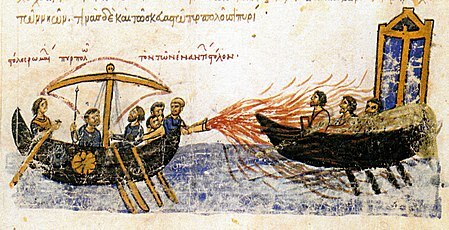 A Byzantine ship using Greek fire against a ship belonging to the rebel Thomas the Slav, 821. 12th century illustration from the Madrid Skylitzes. The tiny rudder of the ship controls its movement and “Greek fire” was a terrifying weapon that we still don’t completely understand; it seems to have been similar to napalm.
A Byzantine ship using Greek fire against a ship belonging to the rebel Thomas the Slav, 821. 12th century illustration from the Madrid Skylitzes. The tiny rudder of the ship controls its movement and “Greek fire” was a terrifying weapon that we still don’t completely understand; it seems to have been similar to napalm. When we put bits into the mouths of horses to make them obey us, we can turn the whole animal. Or take ships as an example. Although they are so large and are driven by strong winds, they are steered by a very small rudder wherever the pilot wants to go. Likewise, the tongue is a small part of the body, but it makes great boasts. Consider what a great forest is set on fire by a small spark. The tongue also is a fire, a world of evil among the parts of the body. It corrupts the whole body, sets the whole course of one’s life on fire, and is itself set on fire by hell. (James 3:3-6)
The tongue was viewed throughout Church history as the key to a person’s inner life. Justin Martyr, Church Father and Apologist, wrote, “By examining the tongue of a patient, physicians find out the diseases of the body; philosophers find out the diseases of the mind; Christians find out the diseases of the soul.” Gossip and idle talk in 2nd Thessalonians mark the followers of the Antichrist, the sower of division and discord. Gossip and idle talk are among the deadliest of the “deadly sins;” if I can eliminate these from my life, I have become nearly perfect.
We can each see ourselves as a ship, directed by the rudder, spewing the medieval weapon of Greek fire at people we consider our enemies–or even our friends, if we are bored and want to hear the sound of our own voices. Greek fire was deadly and inextinguishable; the substance known as “wildfire” in Game of Thrones was based on Greek fire.
Too often we would rather say anything than endure a moment of silence. Or we are hungry for the attention that comes our way when we begin, “Did you hear about ….” We fast from noise, we fast from attention-seeking when we exercise control of our tongue. If there was a 12-step program for Gossipers Anonymous or Idle Talkers Anonymous, we could all sign up and attend the meetings.
St. Gregory of Nyssa thought that hate, envy, and hypocrisy–the three roots of most gossip–are the attitudes most opposed to real humanity. Inasmuch as we have surrendered to these attitudes, we have become subhuman and cannot hope to become the true human beings we were created to be so long as we harbor these attitudes.
We are given the fasting days of the Church to practice control of what comes out of our mouths (gossip) as well as what goes in (food). In the 1979 BCP of the United States, we are called to fast on most Fridays and the weekdays of Lent; in earlier editions of the BCP, there are also Ember Days, Rogation Days, and the eves of 16 major feasts that are considered fasting days.
Fire goes out without wood, and quarrels disappear when gossip stops. Proverbs 26:20
The post A Tongue of Greek Fire appeared first on Stephen Morris, author.
October 25, 2021
Rahab the Prostitute
 Rahab Helps the Spies; The Lord Appears as Captain of the Israelite Host in this 5th century Mosaic in the Nave, Basilica of Santa Maria Maggiore, Rome.
Rahab Helps the Spies; The Lord Appears as Captain of the Israelite Host in this 5th century Mosaic in the Nave, Basilica of Santa Maria Maggiore, Rome.Likewise, was not Rahab the prostitute also justified by works when she welcomed the messengers and sent them out by another road? For just as the body without the spirit is dead, so faith without works is also dead. (James 2:25-26)
So, just who was this “Rahab, the prostitute” that the Apostle James is talking about in the same paragraph as the patriarch Abraham? These two figures from the Old Testament–Abraham and Rahab–are the two most important people that St. James can cite as examples of his point about the necessity of faith-works going together. Rahab must have been quite someone to rank up there with Abraham.
In the book of Joshua, chapters 2 and 6, we are told the story of the spies Joshua sends into the city of Jericho before the Hebrews attacked it. Rahab, a prostitute, hid the spies and made a deal: the Israelite army would spare her and her family when they attacked and massacred the city. Joshua agreed to this. After the city of Jericho was attacked and Rahab’s family spared, she is said to have become the great-great-grandmother of King David; thus, Rahab is an ancestor of Christ.
Although her status as a sex worker might make us think Rahab a person outside the Kingdom of God, it is her action based on her faith in the God of Israel which saves her–and the people of Israel and eventually the world as her bravery and foresight make the Incarnation possible. Her response to God is just as important as Abraham’s — both of them were necessary to save the world.
Early Christian teachers and preachers frequently mentioned Rahab as a woman who demonstrated many virtues (faith, hospitality, repentance) as well as a model for Christians living “in the world” and as a harbinger of salvation. Read more about these sermons here.
In the mosaic above, we see the visit of the “prince of the host of the Lord” to Joshua before the conquest of Jericho (Joshua 5:13-15). That he is an angel is indicated by a halo rather than wings, and his military garb expresses his role as leader of a host. In the text he has a “drawn sword,” but here it is a labarum such as the archangel Michael carries in Byzantine icons.
Seeing this person, Joshua “fell on his face to the ground.” In the mosaic we see only the beginning of this movement.
The lower register illustrated Joshua 2:1-21. Joshua on the left tells his two spies to reconnoiter in Jericho. On the right, the prostitute Rahab (wearing green and standing on the battlements of the city) helps them escape by climbing down the wall.
The post Rahab the Prostitute appeared first on Stephen Morris, author.
October 20, 2021
Religion Pure and Undefiled
 Priest washes his hands in English manuscript illumination AD 1310-1320
Priest washes his hands in English manuscript illumination AD 1310-1320Pure and undefiled religion before God and the Father is this: to visit orphans and widows in their trouble and to keep oneself unspotted from the world. (James 1:27)
Widows were not just women whose husbandshad died. A true widow was a woman whose husband had died and who had no otherfamily—no brothers or sisters, no sons or daughters, no cousins or extendedfamily—to whom she might turn for support. A real widow was a woman mightreasonably have been expected to have someone who would be obligated to carefor her but who, in fact, had no one in the world. She was totallyalone. Bereft of resources. An elderly—or at least older—woman who had nothing.Among the non-Christians, these women were discarded and ignored by society.
Orphanswere likewise those destitute children who had no one who could be expected bysociety to be obligated to care for them. Although an orphan’s mother might bedeceased, the primary definition of “orphan” was a child—or children—whosefather was deceased and who had no uncles or aunts or grandparents or cousinswho would typically be expected to take in the fatherless. Anyone who showedany interest in such a child was probably mostly interested in taking insomeone who could serve as free labor in the household.
Suchdestitute people—true orphans, true widows—were in dire circumstances becausethere was absolutely no expectation or encouragement of charity in Greek orRoman society.
Widows and orphans were referred to as “the altar of God” because they were supported by the offerings of the people and because the widows made intercession for the Church and the larger society. In these first few generations and early centuries of the Church, it was unthinkable that someone could attend the Eucharist and NOT make some small offering if they expected to receive Holy Communion. Receiving Communion went hand-in-hand with making an offering; one was impossible without the other. So what could the baptized orphans do? We know that in some places, the orphans—homeless children completely dependent on the parish for their survival—were responsible for bringing the clean water to be mixed with the wine in the chalice.
This clean water would not only be used to mix with the wine in the chalice. It would be used to wash the hands of the celebrating priest or bishop at the altar (at the conclusion of the offertory) as well as any assisting deacons or concelebrating priests (before receiving Holy Communion themselves). No one thought the priests came to church with dirty hands; the handwashing was an outward portrayal of an inner disposition of spiritual cleanliness and purity.
(For centuries, before all the changes of the 1960s-1970s, the priest would quietly recite verses from Psalm 26 during the handwashing: “I will wash my hands in innocence, O Lord, that I may go in procession ‘round your altar, singing aloud a song of thanksgiving and recounting all your wonderful deeds,” clearly a reference to the upcoming Eucharistic Prayer.)
Suchiconographic handwashing was not limited to the clergy. All Christians wouldwash their hands—some would splash their faces as well—with water before theyprayed at home or entered a church building. The house churches of the firstgenerations of Christians had a fountain in the courtyard which would be usedby people coming to church there; many Christians still perform a stylizedversion of this washing when they enter a church by crossing themselves withblessed water, the small basins beside the church doors tiny versions of thefountains that used to be in the courtyards of the Roman villas used aschurches.
No one thought—or thinks—that people are coming to church with dirty hands. The washing always was—and still is—an iconographic act, an outward portrayal of that inward disposition of being clean from spiritual defilement, being free of worthless—fake—religion.
When we come to the Eucharist, we have to bring something to offer—whether it is as elaborate as our fulltime professional prayers or as simple as a flagon of clean water. As one aspect of our offering, we need to be caring for the destitute in their distress—doing something, enacting true religion that is pure and undefiled.
The post Religion Pure and Undefiled appeared first on Stephen Morris, author.
October 12, 2021
Law of Liberty
 A Byzantine mosaic depicts Moses receiving the Law on Mt. Sinai. Unlike the two tablets of stone usually depicted–as when Charlton Heston played Moses in the “Ten Commandments”–the Torah is depicted as a scroll here which the Lord is handing to Moses. Moses covers his hands with his cloak to protect them as he receives the scroll; directly touching such a holy object that is given directly by God could incinerate his hands if he does not protect them.
A Byzantine mosaic depicts Moses receiving the Law on Mt. Sinai. Unlike the two tablets of stone usually depicted–as when Charlton Heston played Moses in the “Ten Commandments”–the Torah is depicted as a scroll here which the Lord is handing to Moses. Moses covers his hands with his cloak to protect them as he receives the scroll; directly touching such a holy object that is given directly by God could incinerate his hands if he does not protect them.Anyone who listens to the word but does not do what it says is like someone who looks at his face in a mirror and, after looking at himself, goes away and immediately forgets what he looks like. But whoever looks intently into the perfect law that gives freedom, and continues in it—not forgetting what they have heard, but doing it—they will be blessed in what they do. (James 1:23-25)
The “law of liberty,” the perfect law that gives freedom, sounds like a contradiction in terms, right? What law gives liberty and freedom? This law seems to be like a mirror: look into it, see yourself, and then go away and act on what you have seen-realized by gazing. Is this how normal life works?
Although Moses led the people to freedom through the Red Sea, that freedom was not meant for wild parties and living high-on-the-hog, without responsibilities or duties. The freedom of Passover is fulfilled in obedience to the Law given on Mt. Sinai at Pentecost; likewise, the Resurrection of Christ is consummated by the giving of the Spirit on Pentecost–the freedom of new life is sealed by obedience. Freedom is given to the human race so that we can choose to heed the Word of God.
That’s what the “law that gives freedom” is for: by embracing it, we give ourselves to the one who liberates us from Death and are free to love; love is the summary of all the rules and all the laws ever given. Slaves cannot and do not love. Only the free can choose to love. By loving, we commit ourselves to caring. By caring, we commit ourselves to putting someone else’s needs before our own. By putting someone else’s needs before our own, we curtail our options but are able to find fulfillment in what we do, seeing the face of God in those we are committed to.
The post Law of Liberty appeared first on Stephen Morris, author.
October 4, 2021
James, a Servant of God


An icon of the 17th century depicts James as a young boy travelling to Egypt with his father Joseph and his stepbrother Jesus together with the Blessed Virgin, Jesus’ mother. The icon of James as an adult shows him vested as the 1st bishop of Jerusalem. The scroll he holds reads, “O Lord, who blesses those who bless thee….” which is one of the last prayers of the Divine Liturgy of the Orthodox Church.
James, a servant of God and of the Lord Jesus Christ, To the twelve tribes in the Dispersion: Greeting! Count it all joy, my brethren, when you meet various trials, for you know that the testing of your faith produces steadfastness. And let steadfastness have its full effect, that you may be perfect and complete, lacking in nothing. (James 1:1-4)
The epistle of James is probably the first of the New Testament texts to be written. If 1 & 2 Thessalonians were the first epistles written by the Apostle Paul (AD 51-52), the epistle of James (written AD 45) predates the Apostle Paul by 5+ years. Traditionally attributed to “James the Just,” the son of Joseph by his first wife and the stepbrother of Jesus, the epistle that bears his name is more an extended sermon-homily than it is a letter. (This makes it similar to the Epistle to the Hebrews, which is also an extended sermon-commentary rather than a letter per se.)
James, the “brother of the Lord” as he is commonly referred to because they were stepbrothers, was not a believer (John 7:3-5) until after the resurrection (Acts 1:14; 1 Corinthians 15:7; Galatians 1:19). (He was the youngest of Joseph’s children and was a pre-teen when Joseph wed the Virgin Mary. Because James was still living at home with his father and the Virgin, he went down to Egypt with the Holy Family when they fled from Herod after the visit of the Magi described in Matthew 2.) He became the head of the Jerusalem church and is mentioned first as a pillar of the church (Galatians 2:9). He presided at the first council of the Church, held at Jerusalem in AD 50. James was martyred in approximately AD 62, according to the historian Josephus. (Apart from a handful of references in the synoptic Gospels, the main sources for the life of James the Just are the Pauline epistles, the Acts of theApostles, Josephus, Eusebius and Jerome, who also quote the early Christian chronicler Hegesippus and Epiphanius.)
Some think that this epistle was written in response to an overzealous interpretation of Paul’s teaching regarding faith. This extreme view, called “antinomianism,” held that anyone who has faith in Christ is completely free from all rules, whether religious law or secular law, and all the usual moral rules of a society.
As the earliest written description of Christian beliefs and practices, the epistle of James deserves more attention than it generally receives. It shows us not only what the early Church taught but continues to illuminate our path today.
The post James, a Servant of God appeared first on Stephen Morris, author.
September 27, 2021
Apocalypse Epilogue: The Tree of Life
 One of the best-known representations of the Cross as the ‘Tree of Life’ is the 12th century mosaic in the Basilica of San Clemente, Rome.
One of the best-known representations of the Cross as the ‘Tree of Life’ is the 12th century mosaic in the Basilica of San Clemente, Rome. The cross is decorated with white doves, taken to represent the Apostles who will soon fly to all corners of the world carrying the message of Christ’s victory (Psalm 19:4; Acts 1:8).
At the foot of the Cross four rivers flow out (Genesis 2:10) and two deer drink deeply of the river of the water of life (Ezekiel 47:1-12; Revelation 22:1-2); the deer that yearns for running streams (Psalm 42:1-3) quenches its thirst at the fountain of living water that is Christ (Zechariah 12:10; 13:1; John 4:10; 7:37-39; 19:33-37).
Blessed are those who wash their robes, so as to have the right of the tree of life, and may enter the city by the gates. Outside are the dogs, sorcerers, and fornicators, the murderers and idolators, and all who love and practice deceit. (Apocalypse 22:14-15)
This epilogue of the Apocalypse summarizes the message of the book: Christ is coming soon to judge the world and vindicate his saints. The text concludes with the usual threats against anyone who would tamper with the book as the seer has written or dictated it.
Those who wash their robes (in the blood of the lamb) and have access to the tree of life are the faithful members of the Church. They remain faithful despite the persecution described throughout the Apocalypse. The “tree of life” is both a reference to the Cross and Christ himself who transformed the Cross into the antidote for the Tree of Knowledge by which Adam and Eve sinned in Eden. Blood, which typically stains clothing, here washes clothing clean; in the Old Testament, blood both purifies (the sacrifices in the Temple, especially the Day of Atonement) and makes those who touch it unclean.
The list of those “outside the gates” of the New Jerusalem are an interesting summary of all those who personify opposition to God. “Dogs” were a common nickname for the priests of the Cybele, the “great mother” goddess; these “dogs” would castrate themselves in a fit of ecstasy and then wander the streets in groups, singing and praying and asking for alms. In many ways, they sound like the first century equivalent of the Hare Krishna groups that were so common in the 1970s (except the self-castration, of course).
Sorcerers practiced “magic,” which was the usual way to describe illicit religious practices. “Fornicators” practiced porneia (lit. “dirty living”), which included fornication but also could mean a wide variety of other behavior or activities, not all of which we would consider sexual. But it was a quick and easy way to refer to those who misbehaved sexually. Murderers and idolators clearly misapprehended the image of God inherent in each human person. All those who love or practice deceit? That sums up all evil-doing nicely, doesn’t it?
The world is neatly divided into those who have washed their robes vs. those who love and practice deceit. If only life situations and predicaments pre-apocalypse could be so clearly and easily identified!
The post Apocalypse Epilogue: The Tree of Life appeared first on Stephen Morris, author.



